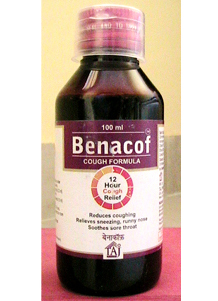|
|
Pseudoephedrine
Hydrochloride / Guaifenesin / Dextromethorphan Hydrobromide
Pronouncation: (SUE-doe-eh-FED-rin HIGH-droe-KLOR-ide/GWHY-fen-ah-sin/DEX-troe-meth-OR-fan
HIGH-droe-BROE-mide)
Class: Antitussive and expectorant combination
Trade Names: Bencof- DM A.F
- Syrup 15 mg dextromethorphan hydrobromide, 100 mg guaifenesin,
40 mg pseudoephedrine hydrochloride per 5 mL
- Tablets 32 mg dextromethorphan hydrobromide, 595 mg
guaifenesin, 48 mg pseudoephedrine hydrochloride
Pharmacology
Pseudoephedrine
Causes vasoconstriction and subsequent shrinkage
of nasal mucous membranes by alpha-adrenergic stimulation, which
promotes nasal drainage.
Guaifenesin
May enhance output of respiratory tract fluid by
reducing adhesiveness and surface tension, enhancing removal of
viscous mucus and making nonproductive coughs more productive
and less frequent.
Dextromethorphan
Suppresses cough by central action on cough
center in medulla.
Indications and Usage
Temporary relief of nasal congestion and cough
associated with respiratory tract infections and related
conditions, such as sinusitis, pharyngitis, bronchitis, and
asthma, when these conditions are complicated by tenacious mucus
or mucus plugs and congestion.
Contraindications
Hypertension; severe coronary artery disease;
MAOI therapy; pregnancy; nursing; hypersensitivity to any
component of product or idiosyncrasy to sympathomimetic amines,
which may manifest as insomnia, dizziness, weakness, tremor, or
arrhythmias.
Dosage and Administration
Adults and Children older than 12 yr of age
PO 1 or 2 tablets every 12 h (max, 4 tablets in
24 h) or up to 2 tsp of syrup 3 to 4 times daily.
Children 6 to 12 yr of age
PO 1 tablet every 12 h (max, 2 tablets in 24 h)
or up to 1 tsp 3 to 4 times daily, not to exceed 4 mg per
kilogram of body weight of pseudoephedrine in 24 h.
General Advice
-
Tablets may be broken in half for ease of
administration. Do not crush or chew tablets or
half-tablets.
-
Administer without regard to meals. Administer with food if
GI upset occurs.
-
Measure and administer prescribed dose of syrup using dosing
syringe, dosing spoon, or dosing cup.
Storage/Stability
Store tablets and syrup at controlled room
temperature (59° to 86°F).
Drug Interactions
Digitalis
Ectopic pacemaker activity may be increased by
pseudoephedrine.
Guanethidine, mecamylamine, methyldopa, reserpine,
veratrum alkaloids
Antihypertensive effects may be reduced by
pseudoephedrine.
Kaolin
May increase pseudoephedrine absorption.
MAOIs (eg, isocarboxazid)
May increase the effects of pseudoephedrine.
Dextromethorphan is contraindicated with MAOIs.
Laboratory Test Interactions
Guaifenesin may interfere with the interpretation
of the test for urinary 5-hydroxyindoleacetic acid for the
diagnosis of carcinoid syndrome.
Adverse Reactions
Cardiovascular
Tachycardia; palpitations; arrhythmias; CV
collapse with hypotension.
CNS
Headache; dizziness; fear; anxiety; nervousness;
restlessness; tremor; weakness; insomnia; hallucinations;
convulsions; CNS depression.
GI
Nausea.
Genitourinary
Dysuria.
Respiratory
Respiratory difficulty.
Miscellaneous
Pallor.
Precautions
Pregnancy
Category C .
Lactation
Contraindicated in nursing women.
Children
Safety and efficacy in children younger than 6 yr
of age not established for tablets and in children younger than
2 yr of age for syrup.
Elderly
Geriatric patients are more likely to exhibit
adverse reactions, such as confusion or CNS depression.
Special Risk Patients
Use with caution in patients with hypertension,
heart disease, asthma, hyperthyroidism, increased IOP, diabetes
mellitus, prostatic hypertrophy.
Cough
To determine that appropriate therapy for the
primary disease is instituted, ascertain underlying cause of
cough prior to use of cough suppressants.
Drug abuse
Has abuse potential.
Overdosage
Symptoms
Pseudoephedrine
Excessive CNS stimulation (eg, excitement,
tremor, restlessness, insomnia), tachycardia, hypertension,
pallor, mydriasis, hyperglycemia, urinary retention, tachypnea,
hyperpnea, hallucinations, convulsions, delirium, arrhythmias,
hypotension, circulatory collapse, hypokalemia
Dextromethorphan
Drowsiness, ataxia, nystagmus, opisthotonos,
convulsive disorders
Patient Information
-
Advise patient to take prescribed dose every
12 h as needed.
-
Advise patient to take with food if GI upset occurs.
-
Advise patient that if a dose is missed to take as soon as
remembered unless it is nearing time for the next dose.
Caution patient not to double the dose to catch up.
-
Instruct patient to discontinue use and report any of these
symptoms to health care provider: nervousness, dizziness,
sleeplessness.
-
Advise patient that if symptoms are not controlled, not to
increase the dose of medication but to inform health care
provider.
Description
Dextromethorphan (dex-troe-meth-OR-fan) is used to relieve coughs
due to colds or influenza (flu). It should not be used for chronic
cough that occurs with smoking, asthma, or emphysema or when there
is an unusually large amount of mucus or phlegm (flem) with the
cough.
Dextromethorphan relieves cough by acting directly on the cough
center in the brain.
This medicine is available without a prescription; however, your
doctor may have special instructions on the proper use of this
medicine for your medical condition.
Other medical problems
The presence of other medical problems may affect the use of
dextromethorphan. Make sure you tell your doctor if you have any
other medical problems, especially:
* Asthma—Since dextromethorphan decreases coughing, it makes it
difficult to get rid of the mucus that collects in the lungs and
airways during asthma
* Diabetes (sugar diabetes)—Some products contain sugar and may
affect control of blood glucose monitoring
* Liver disease—Dextromethorphan may build up in the body and
cause unwanted effects
* Chronic bronchitis or
* Emphysema or
* Mucus or phlegm with cough—Since dextromethorphan decreases
coughing, it makes it difficult to get rid of the mucus that may
collect in the lungs and airways with some diseases
* Slowed breathing—Dextromethorphan may slow the rate of breathing
even further
Make certain your health care professional knows if you are on a
low-sodium, low-sugar, or any other special diet. Most medicines
contain more than their active ingredient, and many liquid
medicines contain alcohol.
Use this medicine only as directed by your doctor or the
directions on the label . Do not use more of it, do not use it
more often, and do not use it for a longer time than your doctor
or the label says. Although this effect has happened only rarely,
dextromethorphan has become habit-forming (causing mental or
physical dependence) in some persons who used too much for a long
time.
Dosing
The dose of dextromethorphan will be different for different
patients. Follow your doctor's orders or the directions on the
label . The following information includes only the average doses
of dextromethorphan. If your dose is different, do not change it
unless your doctor tells you to do so.
For syrup dosage form
For cough
o Adults and children 12 years of age and older—30 mg every six to
eight hours, as needed.
o Children younger than 2 years of age—Use and dose must be
determined by your doctor.
o Children 2 to 6 years of age—3.5 mg every four hours or 7.5 mg
every six to eight hours, as needed.
o Children 6 to 12 years of age—7 mg every four hours or 15 mg
every six to eight hours, as needed.
For extended-release oral suspension dosage form
For cough
o Adults and children 12 years of age and older—60 mg every twelve
hours, as needed.
o Children younger than 2 years of age—Use and dose must be
determined by your doctor.
o Children 2 to 6 years of age—15 mg every twelve hours, as
needed.
o Children 6 to 12 years of age—30 mg every twelve hours, as
needed.
Storage
To store this medicine
* Store away from heat and direct light.
* Keep out of the reach of children.
* Do not store the tablet form of this medicine in the bathroom,
near the kitchen sink, or in other damp places. Heat or moisture
may cause the medicine to break down.
* Keep the liquid form of this medicine from freezing.
* Do not keep outdated medicine or medicine no longer needed. Be
sure that any discarded medicine is out of the reach of children.
Precautions While Using This Medicine
If your cough has not improved after 7 days, if sore throat has
not improved after 2 days, if you have a high fever, skin rash, or
continuing headache with the cough, or if asthma or high blood
pressure is present, check with your doctor. These signs may mean
that you have other medical problems.
Dissolve lozenges in the mouth with caution, to lessen the risk of
choking.
Side Effects of This Medicine
Along with its needed effects, a medicine may cause some unwanted
effects. Although not all of these side effects may occur, if they
do occur they may need medical attention.
Check with your doctor as soon as possible if any of the following
side effects occur:
Symptoms of overdose
Blurred vision; confusion; difficulty in urination; drowsiness or
dizziness; nausea or vomiting (severe); shakiness and unsteady
walk; slowed breathing; unusual excitement, nervousness,
restlessness, or irritability (severe)
Other side effects may occur that usually do not need medical
attention. These side effects may go away during treatment as your
body adjusts to the medicine. However, check with your health care
professional if any of the following side effects continue or are
bothersome:
Less common or rare
Confusion; constipation; dizziness (mild); drowsiness (mild);
headache; nausea or vomiting; stomach pain
Presentation
Benacof
100ml Bottle / 60ml Bottle
|
|








